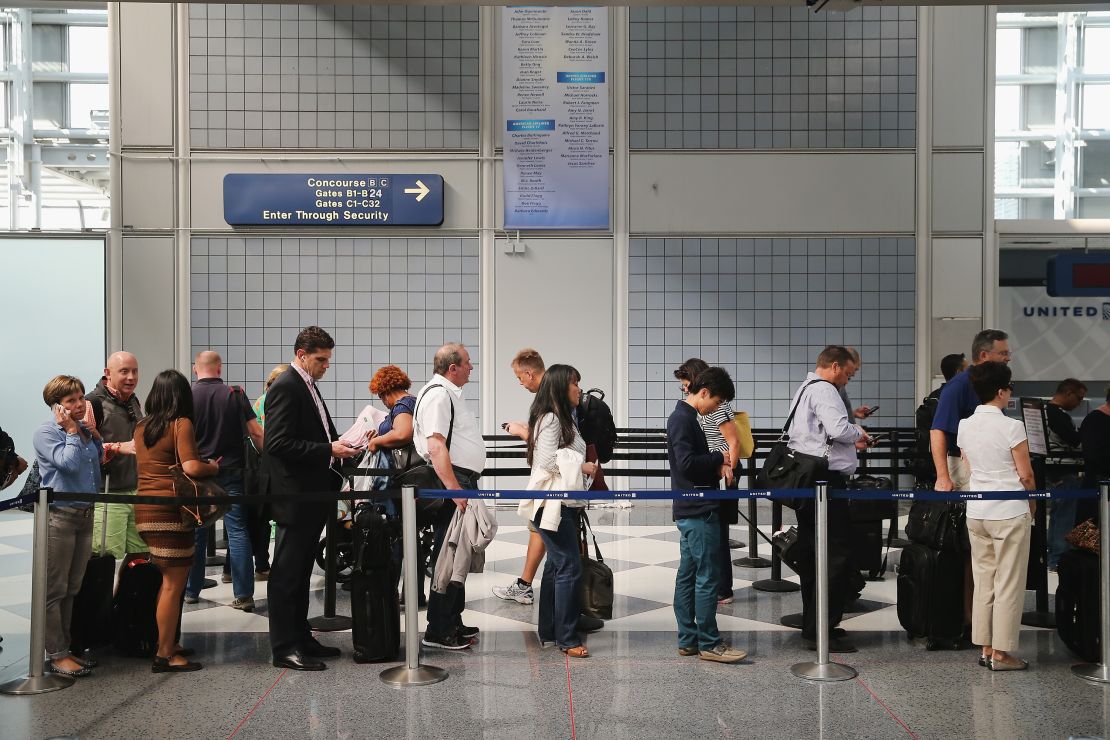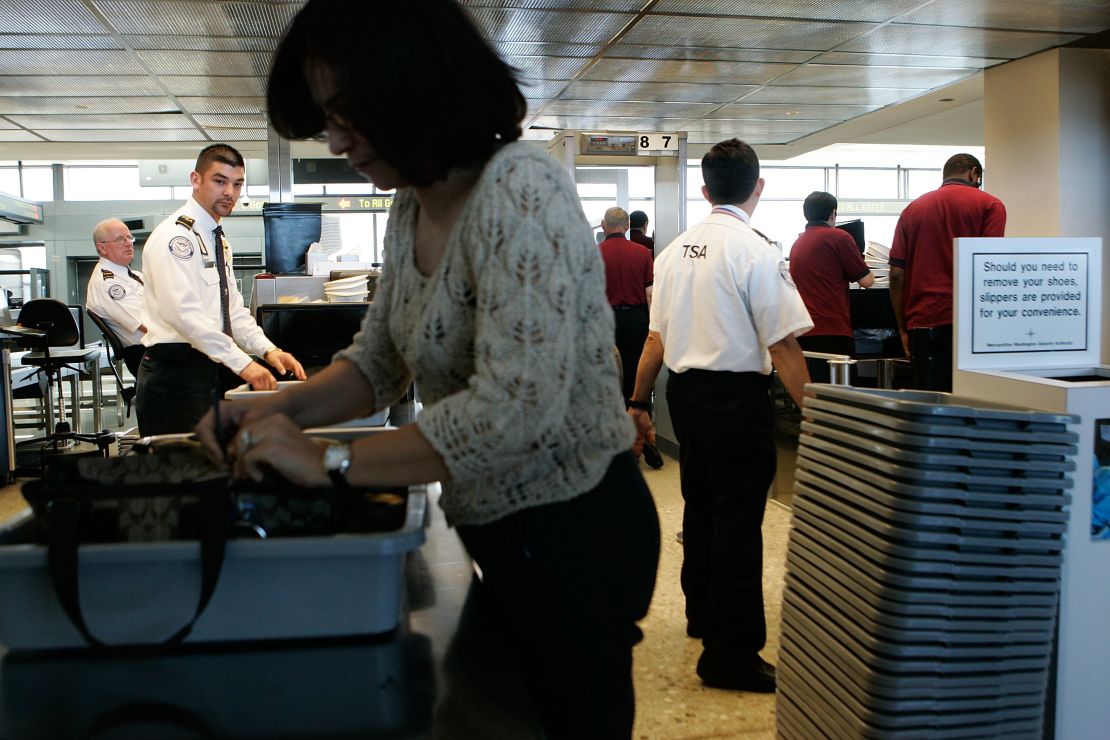We all know the airport security process by now. Shoes off, laptops and tablets out the suitcase and onto the tray. Pockets emptied. Liquids placed in a clear plastic bag.
But what if there was a new step to the process – standing on the scales and being weighed before you board?
What may seem like a personal intrusion to some, could be a way of getting airlines to cut carbon emissions by carrying less fuel, according to British software company Fuel Matrix.
Before every commercial flight, airlines calculate how much weight they’re carrying, based on generic size estimations for men, women and children, which – naturally – aren’t 100% accurate.
If exact weight information is known for each passenger, however, Fuel Matrix says its software can use this information to quickly calculate how much fuel is needed for the journey and optimize the flight plan.
“We’re all becoming more and more aware of our impact on the planet,” Fuel Matrix CEO Roy Fuscone tells CNN Travel. “Aviation is now seen as one of the major polluters […] responsible for about 3% of the world’s C02 output.”
Weighing up the options

Fuel Matrix has also got a separate, but related software system in testing, that allows airlines to work out exact fuel needed just before takeoff. This means any last minute changes to the flight plan – and passengers’ weights – could be accommodated.
The company has tested its fuel calculation software system with major international airlines, using previous flight data.
“They could have saved a lot of fuel and a lot of carbon,” says Fuscone.
Since airlines can incur extra charges for exceeding carbon emission limits, there could be a financial saving. Airports too are under increasing environmental scrutiny.
So how would you weigh passengers in a discreet and unobtrusive way?
One proposal is for passengers to supply the information ahead of arriving at the airport, in the same way that they supply passport details.
Otherwise, it could be made part of the security process before boarding.
“You stand in a scanner that goes round you – now, clearly while you’re standing there being scanned, you could also be being weighed – very discreetly – if you haven’t wanted to supply your information ahead of time,” says Fuscone. “It would be very discreet, very private and very confidential.”
Importance of discretion

Fuscone stresses that Fuel Matrix has been working with GDPR [the EU’s data protection law] consultants to ensure the data would remain classified.
He points out that airports already collect a lot of information on passengers. This would be just one more element to the equation.
“Airports already use biometric data on passengers because they associate an image of your face with your boarding card, so that means that when you buy a ticket it’s already in the contract that they can do that,” says Fuscone.
“So there’s no problem with us introducing this, it can be done at various places during the journey through the airport and so we’re starting to discuss with people involved in those various phases of the airport.”
“If this is all done properly […] it will alleviate carbon in the atmosphere and climate change and air pollution.”
But for some people, such as those with eating disorders, the idea of being weighed in public could be a problem.
“People with or in recovery from these serious mental illnesses may be trying to break the cycle of compulsively weighing themselves or of avoiding knowing their weight,” says Tom Quinn, director of external affairs at BEAT, a UK charity that supports people affected by eating disorders.
“Having to stand on the scales when they may already be anxious about the challenges that come with traveling could trigger their eating disorder behaviors.”
Quinn suggested passengers should be able to opt-out of being weighed, on grounds of health.
“It would be essential that the results are entirely anonymous and that even the person being weighed cannot see the results if they are vulnerable,” he adds.
Higher or lower prices?

Aviation expert Johnny “Jet” DiScala points out the process of weighing passengers is already common on smaller airplanes.
“I have no problem with it – and many travelers who’ve been to the islands of Fiji or French Polynesia and flown on small planes wouldn’t either, because they get weighed and it’s not discreet. I’ve never seen anyone complain,” he tells CNN Travel.
However DiScala points out that if this practice becomes more widespread, it poses ethical issues.
“I just think if airlines started weighing passengers, then eventually they would start charging obese passengers more – and that wouldn’t fly with passenger rights groups.”
It’s not the first time pre-flight passenger weighing has been proposed for standard flights.
In 2015, CNN Travel reported that Uzbekistan Airways planned to start weighing passengers prior to boarding, while in 2017 Finnair announced a program where passengers volunteered to be weighed before takeoff, to collect more accurate data.
Using weight to optimize aircraft fuel also raises questions about whether airlines will try to save money by carrying as little fuel as possible. This could increase the chance of airplanes having to make unscheduled fuel stops when delays or diversions occur, possibly leading to more cancellations.
Fuscone says it would be up to the airline how it uses the weight data to optimize fuel levels. Theoretically, he says, it could result in lower ticket prices.
Fuscone also emphasizes that if lower amounts of fuel was carried by airlines, carriers would still ensure they had enough for emergencies.
Future plans
So could we be standing on the scales at an airport in the near future?
Mike Wooldridge, travel blogger at Transported by Technology, says he doesn’t think its probable.
“This would be at considerable expense to implement – not least as the security control usually doesn’t check boarding cards at present, and the passenger/bag would have to be linked to the particular flight/seat and would require the cooperation of airports/governments,” he tells CNN Travel.
“So I’m not sure the cost/benefit would be in the airline’s favor here […] I don’t think it’ll happen any time soon.”
If passengers were going to be weighed during the security process, airports would need to be retrofitted.
But Fuel Matrix hopes to get its fuel calculation software program implemented quickly. The company says it’s had a lot of support from airlines and airports alike.








